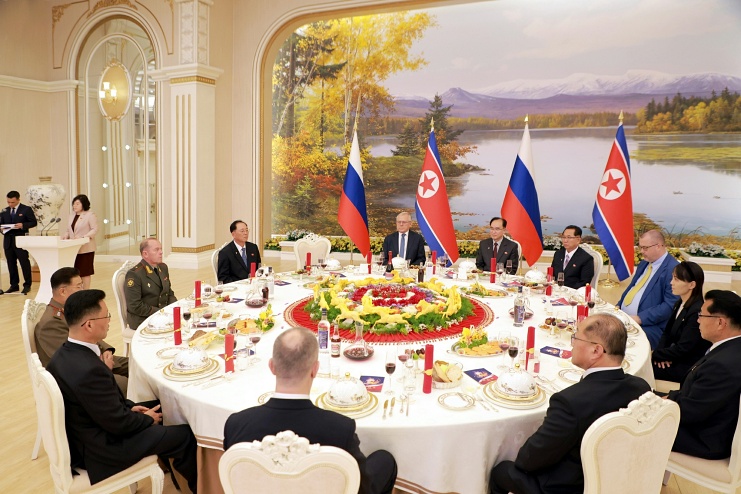 The Rodong Sinmun reported on June 20 that the North Korean Foreign Ministry and the Russian Embassy to North Korea had co-hosted a banquet on the previous day (June 19) to celebrate the first anniversary of the North Korean–Russian Treaty on Comprehensive Strategic Partnership. (Rodong Sinmun-News 1)
The Rodong Sinmun reported on June 20 that the North Korean Foreign Ministry and the Russian Embassy to North Korea had co-hosted a banquet on the previous day (June 19) to celebrate the first anniversary of the North Korean–Russian Treaty on Comprehensive Strategic Partnership. (Rodong Sinmun-News 1)North Korea and Russia are in talks about expanding their cooperation on technology and sending more workers to Russia. The rapid progress they’re making in both military and economic areas suggests their partnership goes beyond simply trying to dodge sanctions.
“The Ministry for the Development of the Russian Far East and Arctic, along with the foreign affairs and defense ministries, are leading cooperation efforts with North Korea in various areas, including construction worker assignments and technical training. The two sides are already working out the details at the operational level,” a source in Russia told Daily NK on Wednesday.
According to the source, Russia is likely to bring in large numbers of North Korean engineers and workers to the Kursk region and the Vladivostok area.
The two countries are currently working out plans to quickly send several thousand more construction workers to Russia, which apparently needs them for reconstruction work in Kursk.
Russia is eager to hire North Korean workers because it sees them as cheap and easily managed labor. This opens up the possibility that North Koreans could end up working on not just regular housing projects, but also industrial infrastructure in areas like communications and energy.
“Russia is pursuing backdoor technological cooperation under the cover of private-sector exchanges. As part of this, North Korea plans to send military officers and engineers to Russia for long-term training that would reportedly include tech students and researchers,” the source added.
The source said this kind of cooperation would benefit both countries. Russia could get affordable technical workers without worrying about sanctions, while North Korea might see it as a chance to upgrade its technical workforce.
Shifting payment methods and expanding trade
There are also signs that Russia may change how it pays North Korea for sending workers overseas.
“They’re looking at the option of switching from cash payments to in-kind compensation. That’s designed to avoid international sanctions while maximizing benefits for both sides,” the source explained.
“Contracts are being drawn up and potential work sites are being inspected in Kursk and Vladivostok. Lower-level officials from both sides seem to be working out the details of the worker assignments, technical training, and in-kind payment arrangements,” the source said.
Trade between North Korea and Russia has surged recently.
In a June 10 report, Russia’s state-owned news agency Sputnik said trade between the two countries in 2024 was worth $34 million. Sputnik cited Evgeniy Nikiforov, chairman of the International Logistics Committee under the Russian Association of Exporters and Importers, as the source of those figures.
Aleksandr Matsegora, Russia’s ambassador to North Korea, said in a March interview with Sputnik that trade between the two countries had expanded rapidly since they signed their comprehensive strategic partnership treaty.
Facing ongoing sanctions from the West, Russia is doubling down on its strategy of making North Korea a key diplomatic partner. North Korea also sees this as an opportunity to break out of a military and economic dead end, which is why their cooperation is expanding beyond national security.
These developments are likely to affect not only enforcement of U.N. Security Council sanctions on North Korea—which completely ban weapons and technology transfers and labor exports—but also the broader international security order.
